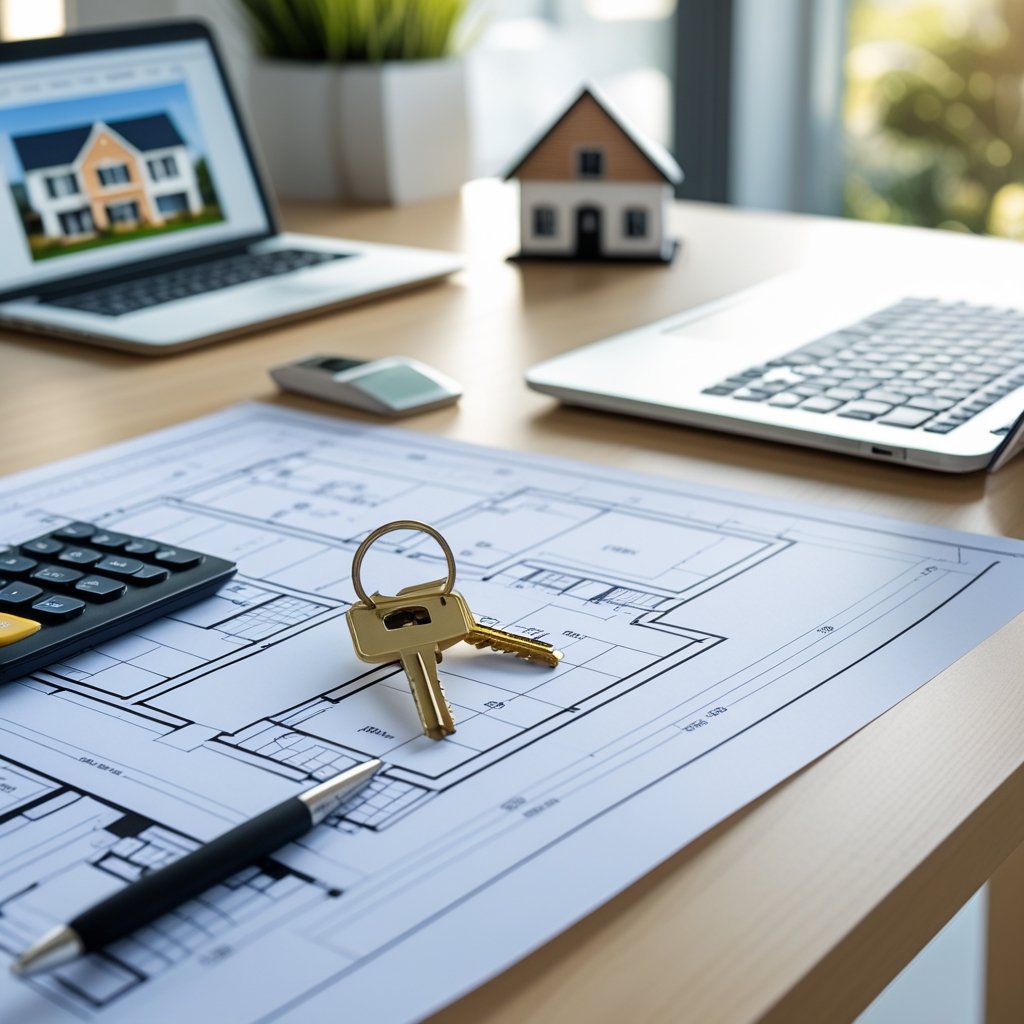Bankruptcy doesn’t mean homeownership is out of reach. If you’ve gone through financial hardship and are ready for a fresh start, you’re not alone—and you’re not stuck.
Many Texans think they have to wait years or have perfect credit to buy again. But with the right strategy and a little guidance, it’s absolutely possible to move from bankruptcy to the front door of your own home.
At Houston Owner Financing, we believe everyone deserves a second chance. Especially when it comes to something as important as owning a home.
That’s why we help buyers find flexible, bank-free paths to homeownership. Alternatives that don’t depend on credit scores or long waiting periods.
Let’s walk through how to buy a house after bankruptcy—and how to do it confidently, on your terms.
Understanding Bankruptcy and Its Impact on Home Buying
Bankruptcy can make buying a house feel complicated, but understanding the basics can help you plan better. You need to know the type of bankruptcy you filed, how it affects your credit score, and the waiting times before you can get a home loan.
Types of Bankruptcy
There are two main types of bankruptcy for individuals: Chapter 7 and Chapter 13.
Chapter 7 clears most of your debts by selling some of your assets. It usually stays on your credit report for 10 years.
Chapter 13 involves a repayment plan over 3 to 5 years, allowing you to keep your property. It remains on your credit report for 7 years.
Knowing which one you filed helps lenders understand your financial situation and decide how risky it is to offer you a mortgage.
How Bankruptcy Affects Your Credit Score
Bankruptcy lowers your credit score significantly, often by 100 points or more. This drop can make it harder to get a loan from traditional banks.
Some lenders work with buyers who have low or bad credit. They offer options that don’t rely heavily on credit scores. You can improve your credit by paying bills on time and reducing debt after bankruptcy. Every small step helps rebuild your creditworthiness.
Waiting Periods After Filing Bankruptcy
Most lenders require waiting periods before approving home loans after bankruptcy. These vary by loan type:
| Loan Type | Chapter 7 Waiting Period | Chapter 13 Waiting Period |
| Conventional Loan | 4 years from discharge | 2 years from discharge |
| FHA Loan | 2 years from discharge | 1 year if making payments |
| VA Loan | 2 years from discharge | 1 year if on payment plan |
While waiting, focus on improving your credit and saving for a down payment.
Preparing Financially to Buy a House After Bankruptcy
Getting ready to buy a house after bankruptcy means focusing on several key parts. You need to build your credit back up, save enough for a down payment, and keep your debts under control. These steps improve your chances of getting approved and help you afford your new home.
Rebuilding Your Credit History
After bankruptcy, your credit score may be low or even missing. To fix this, start by paying all your bills on time. This shows lenders you can handle money responsibly.
You can also get a secured credit card or a credit-builder loan. Use them for small purchases and pay off the balance each month. Avoid opening too many accounts quickly, as that could hurt your score.
Check your credit report regularly for mistakes. If you find any errors, dispute them with the credit bureaus. Steady progress helps you qualify for better financing options.
Saving for a Down Payment
Saving money for a down payment is very important after bankruptcy. Lenders often want at least 5% to 10% of the home price upfront. The more you can save, the better your loan terms might be.
Create a budget that cuts out extra spending and puts money toward your home savings. Set up a separate savings account just for this goal. Look for extra income sources if possible, like part-time work or freelancing.
Managing Debts and Expenses
Before buying a house, keep your other debts low. Too much debt can make it hard to get a loan. Pay off credit cards, personal loans, or other bills steadily.
Track your monthly expenses to see where you can save. Avoid taking on new debts like car loans or big purchases that might raise your debt-to-income ratio.
Pay bills fully and on time. This steady financial behavior gives lenders confidence, especially when combined with owner financing options from companies. They consider your whole financial picture, not just your credit score.
Mortgage Options for Buyers After Bankruptcy
If you’ve gone through bankruptcy, your path to homeownership may seem tricky, but you still have choices. Different types of loans have specific rules about how long you must wait after bankruptcy before applying. Some loans are easier to get, while others have stricter rules about credit and income.
FHA Loans After Bankruptcy
FHA loans are popular for buyers recovering from bankruptcy. You can apply as soon as two years after a Chapter 7 bankruptcy is discharged, but you must show that you’ve rebuilt your credit and have steady income. The FHA is flexible because it insures the loan, so lenders feel safer.
If you had a Chapter 13 bankruptcy, the waiting period is usually one year after the bankruptcy filing, as long as you get court approval to buy a home. FHA loans typically require a minimum credit score of around 580, but some lenders may accept lower scores with a larger down payment.
FHA loans let you put down as little as 3.5%, which helps if you don’t have much saved. FHA loans require mortgage insurance premiums, which adds to your monthly cost.
VA Loans for Eligible Buyers
If you are a veteran or active military member, VA loans offer strong benefits after bankruptcy. The VA doesn’t have a fixed waiting period after bankruptcy but expects you to prove financial stability and a responsible credit record since discharge.
VA loans usually don’t require a down payment or mortgage insurance. This makes them an attractive path if you qualify, especially since your credit score requirements are often more flexible.
You’ll need to provide a Certificate of Eligibility and meet the lender’s income and employment standards. If you don’t qualify for a VA loan, Houston Owner Financing can help you explore other options with flexible terms.
Conventional Loan Requirements
Conventional loans typically have the longest and strictest waiting periods after bankruptcy. For Chapter 7, you usually must wait four years after discharge. For Chapter 13, it’s often two years with proof that you’ve made on-time payments under the repayment plan.
Lenders want to see a credit score of at least 620, though higher is better. You need a good debt-to-income ratio and a down payment usually between 5% and 20% depending on your credit.
These loans don’t require mortgage insurance if you put down 20% or more.
Steps to Take Before Applying for a Mortgage
Before you apply for a mortgage, get your financial information in order. Knowing your credit details, collecting key documents, and getting pre-approved can make the process faster. These steps help you understand what you can afford and show sellers you’re serious.
Reviewing Your Credit Report
Start by checking your credit report from the three main credit bureaus: Experian, TransUnion, and Equifax. Make sure all the information is accurate, especially after a bankruptcy. Look for errors like wrong balances or accounts that should be closed.
You can get free credit reports once a year at AnnualCreditReport.com. If you find mistakes, dispute them right away. Fixing errors can improve your credit score, which lenders watch closely.
Also, understand your credit score range. After bankruptcy, your score may be low, but showing steady progress, like paying bills on time helps.
Gathering Financial Documents
Gather these important papers to prove your income and financial stability:
- Recent pay stubs or proof of income
- Tax returns for the last 2 years, especially if self-employed
- Bank statements from the past 3-6 months
- List of your debts and monthly payments
- Identification like your driver’s license or passport
Having everything ready makes the mortgage process faster. Lenders need to see your ability to pay the loan and cover closing costs. If you’re self-employed or have nontraditional income, showing consistent financial records helps.
Organize your documents in one place so you can easily access them during your mortgage application.
Getting Pre-Approved by Lenders
Pre-approval means a lender checks your financial info and tells you how much you may borrow. This step shows sellers you’re serious and ready to buy. It also helps you pick homes within your budget.
To get pre-approved, send your financial documents to the lender. They’ll look at your income, debts, and credit. Unlike traditional banks, some lenders and owner financing companies may be more flexible about credit issues after bankruptcy.
Ask about the pre-approval terms, like loan limits and needed down payments. This way, you can shop for homes with confidence.
Finding and Purchasing the Right Home
Knowing how to find a home that fits your needs and budget is key to a smooth buying process after bankruptcy. You’ll need help from the right people, keep track of your finances, and learn how to make strong offers that sellers will consider seriously.
Working with an Experienced Real Estate Agent
A good real estate agent can make a big difference when buying after bankruptcy. Look for someone who knows the Houston market well and understands owner financing. This way, they can guide you to homes where flexible payment options are available.
Tell your agent about your situation upfront. They can help avoid homes that require strict bank loans you might not qualify for. An agent familiar with alternative mortgage options or Texas owner financing will save you time and stress.
Agents can also introduce you to sellers open to owner financing, or connect you with trusted companies. This support makes finding a home more realistic when regular lenders turn you down.
Home Shopping with a Budget
Set a clear budget before you start looking. Your budget should consider money you can put down, monthly payments, and extra costs like taxes and repairs. Staying within your limits prevents surprises later.
Use a checklist to track homes:
- Price
- Location
- Size and bedrooms
- Condition and needed repairs
- Owner financing terms (if available)
Focus on neighborhoods with reasonable prices in Houston. Owner financing often lets you skip the bank but does mean monthly payments must fit your income. Knowing this helps you choose homes you can actually afford.
Making Offers and Negotiating
When you make an offer, remember sellers often prefer buyers with stable financing. Owner financing can help your offer stand out because it usually closes faster and requires fewer steps.
Offer a fair price based on the home’s condition and market value. Ask the seller about payment plans, interest rates, and down payment options. Negotiate these terms to fit your budget.
Finalizing Your Home Purchase
After you find the right home and secure financing, finish the key steps before moving in. Complete the loan paperwork and make sure the property meets your expectations through inspection and appraisal.
Completing the Loan Process
Submit all required documents to your lender or financing service, such as income proof, tax returns, and identification. This confirms your ability to pay and addresses any concerns from your bankruptcy history.
Review and sign the loan documents carefully. These include the promissory note and purchase agreement. Ask questions if anything is unclear before you commit.
Some companies guide you through this paperwork, making the process simpler and less stressful. Once you sign everything, the loan moves toward approval and funding.
Home Appraisal and Inspection
A licensed appraiser visits the property and compares it to similar homes in your area to set the official market value.
Get a home inspection to check for hidden problems like leaks, electrical issues, or structural concerns. A qualified inspector ensures the house is safe and worth the price.
Use the results to ask the seller for repairs or a price reduction if problems come up. This step helps you avoid surprises after you buy.
Tips for Long-Term Homeownership Success
Owning a home after bankruptcy takes effort, but you can build a strong future. Start by making on-time payments every month. This improves your credit and shows lenders you are responsible.
Keep your budget simple. Track your income and expenses so you don’t miss payments. Set aside money for repairs and unexpected costs.
Stay in touch with your lender or a reputable company. They can help if you run into trouble or have questions.
Check your credit report regularly. Fix any errors and watch your score improve over time. As your credit grows, you may qualify for better financing later.
Think of your home as a long-term investment. Keep up with maintenance like lawn care, roof checks, and small repairs. This protects your home’s value and saves you money on big fixes.
Remember these tips:
- Pay bills on time
- Budget for emergencies
- Keep communication open
- Monitor your credit
- Maintain your home
Following these steps will help you keep your home and enjoy the security of owning in Houston.
Common Mistakes to Avoid When Buying After Bankruptcy
A big mistake is rushing into home buying without checking your credit and finances first. Take time to rebuild your credit and save for a down payment. Buying too soon can lead to higher interest rates or loan denials.
Don’t rely only on traditional banks. After bankruptcy, banks can be strict. Consider owner financing homes through trusted companies. This option skips the bank and makes buying easier.
Stick to your budget. It’s tempting to choose the nicest home, but focus on what you can afford. Missing payments after bankruptcy can hurt your credit again.
Get pre-approved before house hunting. Pre-approval shows sellers you’re serious and helps you know your price range.
Watch for hidden fees or terms you don’t understand. Read contracts carefully and ask questions. Getting expert help can prevent surprises that slow down your buying process.
Common mistakes checklist:
- Rushing to buy too soon
- Only using traditional banks
- Ignoring your monthly budget
- Skipping pre-approval
- Overlooking fine print in contracts
Avoid these traps to make your path to homeownership smoother and more successful.
Reclaim Homeownership on Your Terms
Bankruptcy doesn’t have to be the end of your homeownership journey—it can be the beginning of a smarter, more flexible path forward. By rebuilding your credit, saving strategically, and exploring nontraditional financing, you can buy a home in Houston without waiting years or facing bank rejection.
With Houston Owner Financing, you don’t need perfect credit or endless paperwork. Just a commitment to move forward—and a partner who understands your unique situation.
Let’s turn your fresh start into a front door. Schedule a free call today and explore your path to homeownership—no bank required.
Frequently Asked Questions
Buying a home after bankruptcy means facing specific rules about timing, credit, and loan options. You will want to know how long to wait, what credit scores matter, and ways to improve your chances for approval.
What is the waiting period to buy a house after filing for Chapter 7 bankruptcy?
After a Chapter 7 bankruptcy, you usually need to wait 2 to 4 years before you can apply for a mortgage. The exact time depends on the type of loan you want and the lender’s rules.
Is purchasing a home possible after completing a Chapter 13 bankruptcy plan?
Yes. Once you finish your Chapter 13 plan, you can often buy a house. Waiting times are shorter—often 1 year after completing the plan—but it varies by lender.
How does bankruptcy affect the chances of a first-time home buyer getting approved?
Bankruptcy lowers your credit score and can make approval harder. However, you can still get approved if you show steady income, savings, and good credit habits after bankruptcy.
What are the VA loan requirements for buying a house after a Chapter 7 discharge?
For a VA loan after Chapter 7, the waiting period is usually 2 years after the discharge. You must also show you’ve rebuilt your credit and have a steady income.
What minimum credit score is required to secure a mortgage after bankruptcy?
Most lenders want a credit score of at least 620 after bankruptcy. Some special programs and Houston Owner Financing options might accept lower scores.
What steps should be taken to improve the likelihood of home loan approval following bankruptcy?
Pay bills on time, save for a down payment, avoid new debt, and check your credit report for errors. Houston Owner Financing can help you bypass strict lender rules when buying your home.




